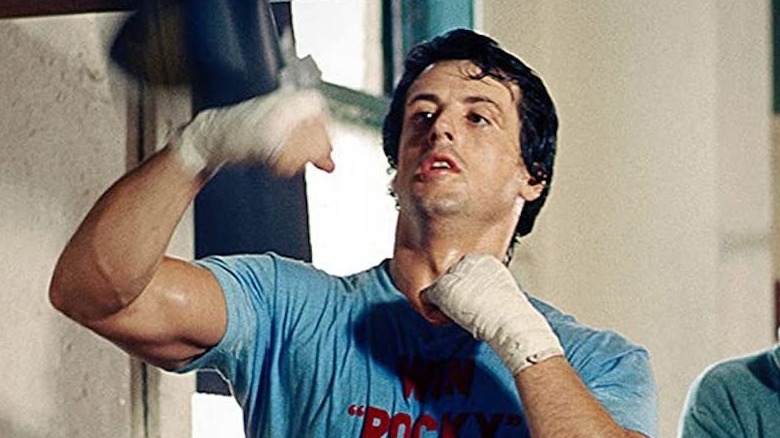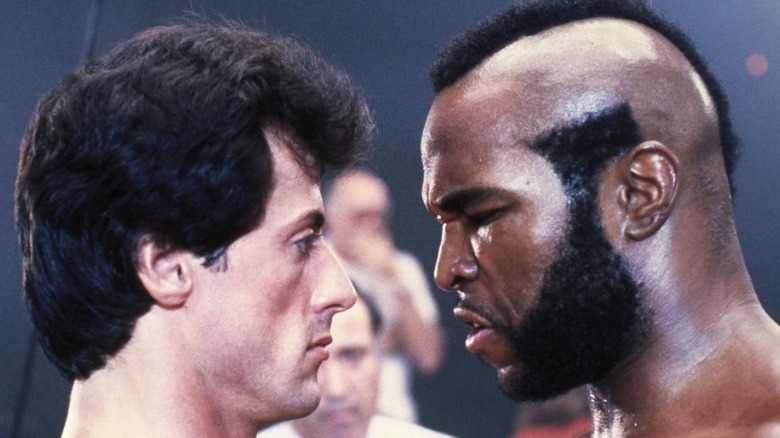Sylvester Stallone Found The 'Key' To Rocky's Character In A Film From Decades Before
Some people would be surprised to learn that Sylvester Stallone is not only the star of the "Rocky" films, but also the writer. He even scored an Oscar nomination for Best Original Screenplay in 1977, while "Rocky" itself received Best Picture. Stallone is actually a prolific scriptwriter, ever since selling his first feature-length script, "Hell's Kitchen," in 1975. He's written every single "Rocky" film, as well as the "Rambo" films. Stallone's screenwriting prowess shows that he's more multi-faceted than the dumb action star that many like to paint him as, and "Rocky" was his first, and perhaps biggest, success.
Stallone's script for "Rocky" was highly sought after, and because he was nearly broke at the time, Stallone fought to ensure that he would not only sell the script but star in the film, despite resistance from many studios. He managed to secure the leading role and the sale of the script, and the rest is history.
One of the most iconic aspects of the character of Rocky Balboa is his fixation on facing the world with "the eye of the tiger." This facet of the character was something Stallone had been saving for years, ever since his days as a movie theater usher. It was this idea, which came from the 1969 film "A Dream Of Kings," which became what Stallone would describe as "the key to the character."
Inspiration strikes
Stallone has never been afraid to cite the places where his ideas originated. His initial idea for the "Rocky" series itself came after he watched Muhammad Ali fight Chuck Wepner in 1975. "Chuck Wepner was basically a guy who everybody considered a joke. He was known as the Bayonne Bleeder, and it was clear that his only notable contribution to the history of pugilism would be just how badly Ali would destroy him," said Stallone in a GQ interview from 2018. He recalled the fight, where Wepner was a "zillion-to-one" underdog, who everyone was counting out long before the fight started. Then something happened.
"Then, all of a sudden, something incredible happened. From nowhere, Wepner knocked down the immortal Ali."
Stallone recalled the crowd immediately turning, supporting Wepner for the rest of the fight. Wepner didn't win, but Stallone took a lot of inspiration from his losing effort. "So I'm sitting there watching all this, and at some point I realize that the whole thing's a metaphor, and I realized that it wasn't really about boxing. Actually, "Rocky" was never really about boxing, it was about personal triumph."
Similarly, the concept of "the eye of the tiger" was a piece of inspiration Stallone took from "A Dream of Kings." "At the time I was a movie usher at the Baronet Theater across from Bloomingdale's in New York City," said Stallone in a Chicago Tribune piece in 1986. "And I kept hearing him say, 'Each day, my son, you must wake up and face life with the eye of the tiger.'"
The eye of the tiger
Sure enough, the eye of the tiger became a key aspect of the character of Rocky Balboa. The saying wouldn't show up in the films until "Rocky III" in 1982. But at that point, it became one of the most famous movie quotes in history, showing up all over pop culture. The song Eye of the Tiger, written as the theme song of "Rocky III" by rock band Survivor, topped charts worldwide in 1982.
The "Rocky" franchise would continue to be wildly successful, with five installments in the main series as well as two spin-off "Creed" movies, which follow the son of Rocky's friend and rival Apollo Creed. There are even talks for Stallone to write a Rocky prequel series in the near future.
The "Rocky" films are about not giving up. They're about reaching deep inside yourself and giving every challenge your all, no matter how impossible they may seem. And Sylvester Stallone exemplified this in his efforts to get the movie made with him as the star. He started as a struggling actor with $100 to his name and became one of the world's biggest movie stars. He persevered. In other words, he faced the world with the eye of the tiger.


